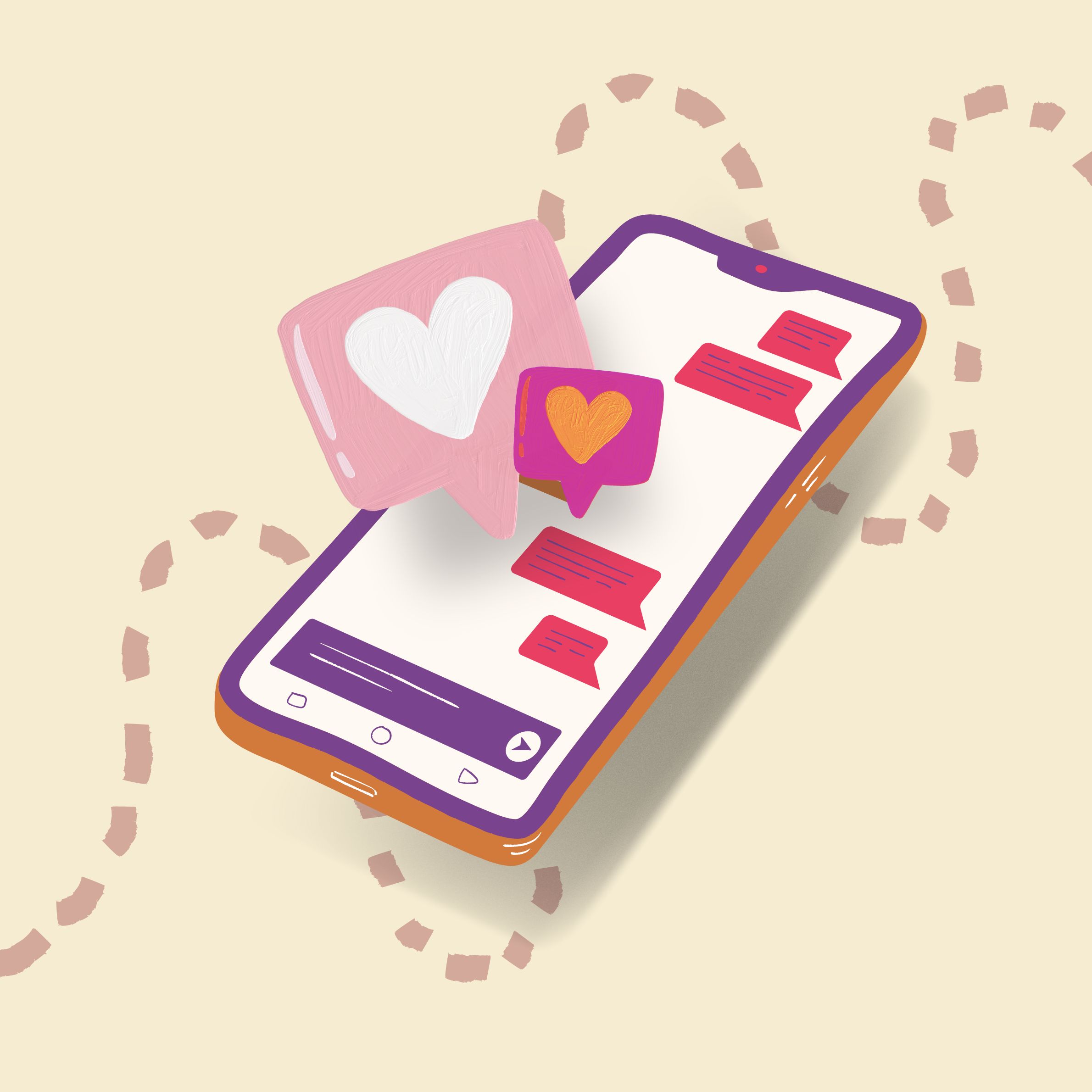Written by Bibhu
I installed Tinder for the first time a few years ago to ‘get over’ an ugly breakup. Extraordinarily soon after pledging singlehood, I needed to fall into one dalliance then another. Or so to speak, my body asked for one. My best friend had found her then partner on Hinge, which had set my expectations unrealistically high. Pleasantly going gaga over my best friend’s relationship after they matched on Hinge and third wheeling them once in a while to learn about dating apps gave me hope to find someone my best friend could third wheel me with.
‘Sapiosexual. Looking for a reason to delete this app.’ A bio read. It was my first right swipe, because why not! The bio sounded cool. Then almost every profile out of the first hundred was sapiosexual or looking for a reason to delete that app. Surprisingly almost everyone mentioned ‘Netflix and chill’, ‘adventure lover’, ‘looking for a travel partner’, ‘bike lover’ in their bio, followed by a witty one liner copied and pasted from dating guru websites. There were some empty, no picture and bio too, which I assume get very less to no match at all.
While I had a good pool of people to talk to or consider for a rebound to lessen all the emotional complications I was going through, I cannot deny how it exhausted me to start a conversation with ‘hi’, ‘how are you?’, ‘what do you do?’ and ‘your dog looks cute’. After the conversation got boring and I lost interest in a match, I resolved with an unmatch of course. On the other hand, I would never be sure when somebody asked what I was looking for. That question started getting tiresome after a point.
During covid lockdown, dating apps were my only way out to interact and meet with people. I would meet some random people for a walk around the beach, or dinner followed by a brief makeout before 6 pm because they would shut every place down by 6:30. This too started getting exhausting after one point but the dating app is not to be blamed for that.
Till today whenever I feel the need for it, I find it extremely convenient with dating apps to connect with people from the comfort of my home at any time without the need to go out and unnecessarily socialize. This goes perfectly with my messed up schedule and limited mobility.
There are times these applications have helped me in my emotional release- from expressing my thoughts and feelings to relieving a lot of stifled stress and anxiety. These are the days I find myself communicating better with random strangers on dating apps just to rule out the possibilities of being judged. Conversations include anything from my perspectives and needs to random stuff that do not even make sense. This definitely has helped me take control of my own emotions, leading to self-awareness. These are the times when I am resolving my conflicts with self and tinder or bumble have truly helped.
I have often found myself being a part of this sex positive scene. There are times when we settle down on not asking names and phone numbers and letting it be a just one-time thing. Coming from a family that had its men look down upon women when they tried advocating the kind of lives they wanted to earn for themselves on their own, or shamed us for our sexual behavior to conform to their narrow standards of ‘sanskaar’, it somehow feels liberating to have an agency to decide who I spent the other night with.
The instant gratification and endless swiping however can be addictive. And not going to lie, I have spent endless time trying to find a perfect match to an extent of exhausting my daily limits. A few wholesome matches have been worth the hassle.
There are days when all I need is attention and some sort of validation. These are the times I am unable to recall my own worth or measure my actions against somebody’s. That is when dating apps come handy to validate or approve this impermanence through someone else’s gazes– someone I didn’t even know existed. Human emotions are complex.
These moments arise when I feel unsure about my own worth or struggle to evaluate my appearance or sexiness objectively. Dating apps offer me a convenient platform for seeking validation and approval. I have had a few matches whose interest, attraction or admiration significantly influenced my perception of myself during those particular moments. This external validation can temporarily alleviate feelings of uncertainty and reinforce a sense of self-worth.
While I fully acknowledge that seeking validation from strangers can offer a temporary boost, relying solely on them for validation can create a cycle of emotional dependency and may not lead to genuine, lasting confidence. However, I must also recognize that they have played a nurturing role in my journey towards cultivating self-acceptance and self-worth that is independent of their opinions.
And then there are days when these conversations lead nowhere as either of the parties ghosts the other without any explanation or closure because apparently in this world of matches, who owes that to a random stranger? In such cases, there is no room for a conflict resolution where you allow each other to understand each other’s perspectives. After one point, you start normalizing this as well once it just starts getting burdensome, exhausting and relentless.

I once had a colleague who grew tired of trying various dating apps because they often found the social status of their matches conflicting with their own. It was during this search that they came across Jodable, an app that is now retracted from the app store but was quite a thing until two years ago in India. The app aimed to connect people based on their caste, which is not surprising considering it emerged as a product of Brahmin boys’ fantasy to preserve caste purity.
In addition to allowing users to specify their caste, it also bizarrely allowed individuals to mark their virginity status and share extensive details about their families. These features reinforced the notion of evaluating potential matches based on social status and perpetuated the survival strategies necessary in a brahminical society. It was an especially problematic platform for anyone who did not fit the mold of an upper caste, cisgender, heterosexual man.
Now that I reflect upon it, every dating app in the South Asian region seems to be shaped by the preferences and norms set by caste Hindus. Raise your hands if you have come across profiles of individuals proudly flaunting their swimmer bodies but with a janeu/janai on, pose in front of temples holding pooja flowers, or someone just flaunting their dhaka topi to indicate their caste and regional identity. Subtle tactics employed by “daddy’s little prince charmings” to reinforce oppressive norms.
There are no disagreements on how an online dating experience for an individual has gotten easy, even for screening for compatibility. But do they not reflect what they already hold as biases in their real lives? For instance, you will find everyone subtly hints at their social capital which limits the pool of potential dates for people who come from communities you would consciously not hang out in real life. As a result, these factors can have a significant impact on an individual’s personal life and their left or right swipes.
At the end of the day, these niche interests are often found catering to specific interests or communities, allowing users to connect with others who share not just similar interests or lifestyles, but also favorable caste location as defined by the brahminical system in a society like ours.
I have encountered cis-het men who are vocal on social platforms about various topics but are contradictory in their approach when it comes to dating apps. They may actively search for a potential match on these platforms but simultaneously express a preference for their family and relatives to find them a long-term partner. In their view, the idea of a woman actively seeking a partner on a dating app is considered blasphemous or inappropriate. Their hesitation or reluctance to find a partner on a dating app might stem from cultural or societal expectations surrounding the role of families in arranged marriages or conservative notions of how relationships should be initiated. These contradictory behaviors can highlight the influence of societal norms and the complex dynamics that individuals navigate when it comes to dating, particularly in relation to cultural or familial expectations.
Swipes are political. Dating apps certainly have revolutionized the way we meet and date and get to know people we have never heard of before. But who we choose to swipe right or left is indeed political.
Dating apps have also incorporated a multitude of gender and sexual identities, which holds significant importance for queer individuals in the dating scene. It is crucial to recognize that sexuality has always been political and in turn, how we discover and express our sexuality through dating apps and online, is by default a political act.
In my personal experience, these applications have played significant a role in facilitating my exploration and expression of my sexuality. Dating apps these days have been instrumental in this process by recognizing and validating diverse experiences within the queer community, offering users a range of options to select from in terms of gender identities and sexual orientations.
These apps have provided a platform for queer individuals to discover acceptance, forge connections, and find community, which can often be challenging in real-life spaces. These apps offer spaces where individuals can seek relationships and connections that go beyond the boundaries of heteronormativity and traditional dating norms.
By actively participating in dating apps and engaging in online dating, a lot of individuals are taking a stand and asserting their identities. They are claiming their rights to love, desire, and intimacy on their own terms. In doing so, they contribute to a larger movement towards inclusivity, acceptance, and social change, promoting a more diverse and understanding society.
During conversations with my friends for this article, they all envisioned a strong connection based on shared ethics and how it influences their perception of safety on dating apps. Throughout the process of creating their app profiles, interpreting others’ profiles, and engaging with interactions, they continuously juggled their sense of responsibility towards fellow users, while also considering personal security and exploring their own desires and interests. This highlights the need for diverse individuals to contribute nuanced articles and broader discussions based on their personal experiences, thereby enriching the literature on the Nepali dating scene.
The wide range of identities and socio-political beliefs represented on dating apps can be instrumental in determining the kind of people you desire to interact with. For me, political compatibility holds more significance than simply being attracted to shirtless selfies. Identifying shared values and beliefs is crucial, yet complex.
And until I find my person on dating app, the endless swipe continues.
 Bibhu, hailing from Kirtipur, is a part-time researcher/writer, full-time overthinker/procrastinator, and an aspiring WWE wrestler. She holds a deep interest in examining political systems through a feminist and anti-caste lens. During her leisure time, she finds joy in reading, painting, and occasionally shedding a tear or two.
Bibhu, hailing from Kirtipur, is a part-time researcher/writer, full-time overthinker/procrastinator, and an aspiring WWE wrestler. She holds a deep interest in examining political systems through a feminist and anti-caste lens. During her leisure time, she finds joy in reading, painting, and occasionally shedding a tear or two.
